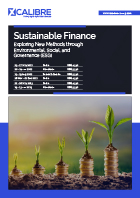| Date | Venue | Fee | |
|---|---|---|---|
| 18 May - 22 May 2026 | Dubai – UAE | $ 5,950 | Register Now |
| 15 Jun - 19 Jun 2026 | Marrakesh - Morocco | $ 5,950 | Register Now |
| 10 Aug - 14 Aug 2026 | Sharm El Sheikh - Egypt | $ 5,950 | Register Now |
| 23 Nov - 27 Nov 2026 | Dubai – UAE | $ 5,950 | Register Now |
| 25 Jan - 29 Jan 2027 | Dubai – UAE | $ 5,950 | Register Now |
About the Course
Environmental, Social and Governance criteria ("ESG") are standing at the top of the global agenda. The investor's objective in the financial sector is always to preserve and grow capital. With the concept of ESG, all the investors try to do so with social and environmental objectives in mind; they are trying to achieve the same return objectives from their capital but are doing so in a socially responsible way. The combination of the copious legislative activity in quick succession and the strong investor demand for sustainable products impacts the financial sector. Accordingly, Sustainable finance plays a vital role in the financial sectors by providing the investors in making their decisions with tools to consider the environmental, social, and governance (ESG) factors of economic activity or project.
Environmental factors include mitigation of the climate crisis or use of sustainable resources. Social factors include human and animal rights, consumer protection, and diverse hiring practices. Governance factors refer to public and private organisations' management, employee relations, and compensation practices.
Core Objectives
Upon successful completion of this course, the delegates will be able to:
- Understand the purposes and principles of sustainable finance
- Analysis of the key environmental, social, and governance (ESG) issues
- Build an action plan for integrating sustainability across their businesses
- Develop a risk management plan for the financial sector
- Recognise the new products and business opportunities
Training Approach
This training course will use various proven learning techniques to ensure maximum understanding, comprehension, and retention of the information presented. It will follow a participative workshop format that focuses on developing practical skills that delegates can apply in real-life business situations on return to their organisation.
The Attendees
This training course is suitable for a wide range of individuals but will greatly benefit:
- Financial Managers
- Investment Funds
- Financial Advisors
- Risk Department
- Budget Managers
- Commercial Managers
- Project Managers
- Anyone interested in how Financial Institutions
Daily Discussion
DAY ONE: OVERVIEW OF SUSTAINABLE FINANCE
- Definition of Sustainable Finance
- Importance of Sustainable Finance
- The principles of Sustainable Finance
- Environmental, Social, and Governance (ESG) Issues
- The International platform on sustainable finance
DAY TWO: DEVELOPING SUSTAINABLE FINANCE
- Main characteristics of sustainable finance taxonomies
- Multiple options for Policymakers
- National vs Internationally Interoperable
- Data Availability and Disclosure
- The design of a practical sustainable finance taxonomies principles
DAY THREE: ESG & SUSTAINABLE FINANCE
- The Spectrum of ESG Approaches
- Types of ESG Approach
- Global Initiatives on ESG Investing
- The primary reason for your selecting ESG factors
- ESG across Assets Classes
DAY FOUR: SUSTAINABLE FINANCE EFFECTS ON FINANCIAL SECTOR STAKEHOLDERS
- The impact on Governments & Population
- The role of Regulators and Supervisors
- Impact on Institutional Investors
- The effects on Banks, Insurers, and Exchanges
- The impacts on Foundations & Companies
DAY FIVE: RISK MANAGEMENT OF SUSTAINABLE FINANCE
- Concept of Business Risk
- Understand the relationship between risk and return
- Main Risks Sustainable Finance and Impacts
- Monitoring, assessing, and analysing ESG markets and risks
- The Sustainable Finance Roadmap
Certificate Awarded
Upon successful completion of this training course, participants will be awarded a Certificate of Completion from XCalibre Training Centre, acknowledging their accomplishment. This certificate serves as a testament to their dedication to developing their skills and advancing their expertise in their respective fields.



